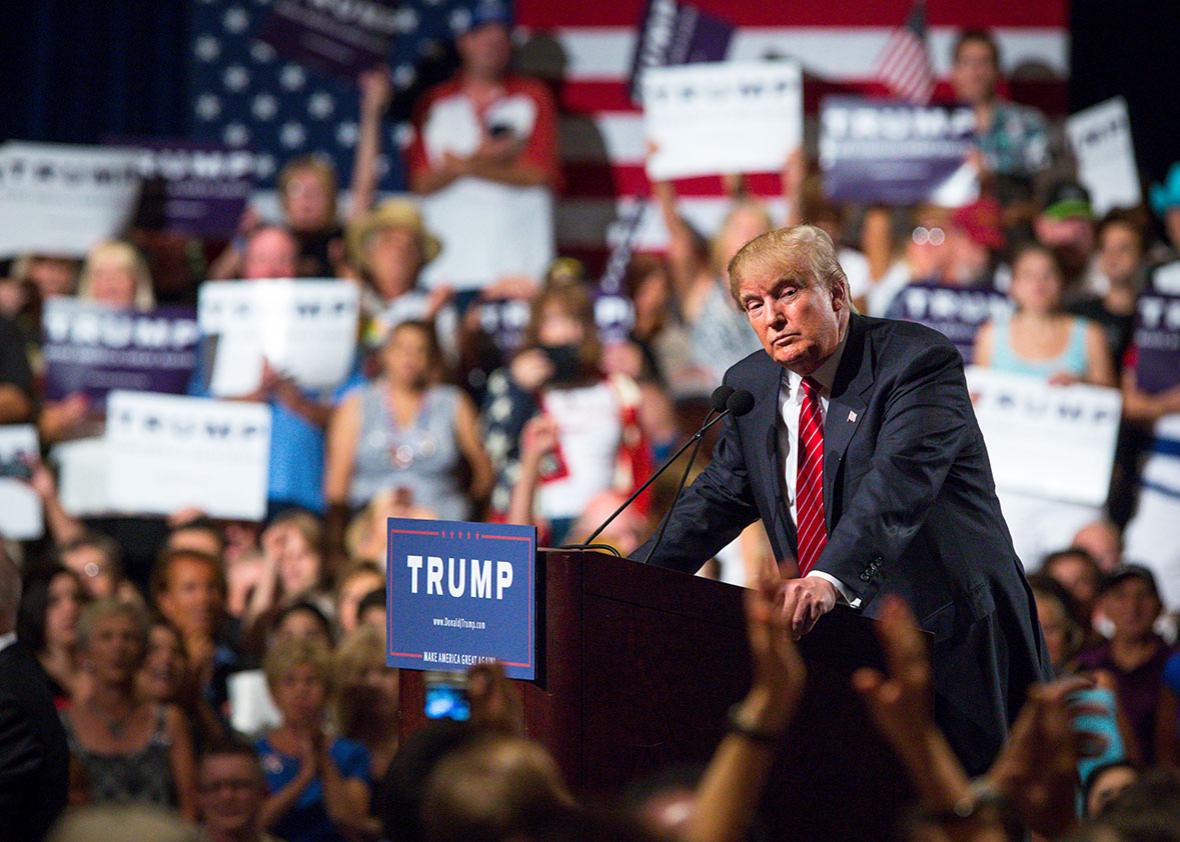Look around the landscape of American politics, and one thing is clear: Voters are furious. On one side, they’re angry about Barack Obama, immigration, and the perceived impotence of their elected officials. On the other, they’re angry about Wall Street, economic inequality, and a government that has—in their view—been captured by billionaire plutocrats.
This anger, notes Philip Rucker for the Washington Post, is key to the puzzle of summer 2015, where political life has come to resemble a hackneyed episode of The West Wing. As of this week, real estate tycoon and reality television star Donald Trump commands press attention and (not coincidentally) a strong lead in the Republican presidential primary, while Vermont Sen. Bernie Sanders—a self-described socialist on the periphery of American politics—is the leading opponent to Hillary Clinton in the Democratic contest, with a tentative lead in the New Hampshire primary. Here’s Rucker with analysis from party strategists and other campaign professionals:
“There’s a longing for real authenticity in politics today,” said Tad Devine, a Democratic strategist who is advising Sanders. “People feel that the candidates are too manufactured, there’s not enough spontaneity. They want someone who, even if they don’t agree with them, is telling it like they see it, really leveling with voters. I see that with Bernie and I think with Trump, too. It’s resonating very powerfully.” …
“There’s a disquiet, discomfort, and angst that so many people are feeling,” said GOP pollster Whit Ayres, who advises Sen. Marco Rubio (Fla.). “They’re scared economically, they’re scared about what’s happening with our adversaries, and it makes them really, really uncomfortable with where the country’s going and where the leaders are going.”
To a degree, this is boilerplate. In an environment like this one—or the 2012 Republican primaries, where candidates like Herman Cain and Newt Gingrich had their time in the spotlight—voters are angry with the status quo is the only explanation that makes sense. At the same time, that doesn’t mean it’s true. Yes, Sanders and Trump are unexpectedly popular, but how angry are American voters, really? Are they unsatisfied with the status quo, or is this just sound and fury, signifying nothing?
Judging from what we hear, the answer is yes, voters are angry, and even outraged. Just 19 percent of Americans trust Washington to “do what is right” either most of the time or all of the time. The remainder, 81 percent, are deeply skeptical. The same goes for trust in Congress. In 2014, according to Gallup, 15 percent of Americans approved of Congress—the second-lowest rating in 40 years of polling. The lowest rating was the year before, when 14 percent of Americans approved of Congress. And in a CNN poll from last year, before the midterm elections, 30 percent of Americans said they were “very angry” with the direction of the country, while 38 percent said they were “somewhat angry.”
But instead of polls, let’s judge from what we see, and specifically, how voters act. For as much as Americans hate politicians, they never seem to throw the bums out. On Election Day 2014, Americans sent 396 incumbents back to Washington out of 416 who ran for reelection, for an incumbency rate of 95 percent. In 2012 the rate was 90 percent for House members and 91 percent for senators, and in 2010 it was 85 percent and 84 percent, respectively. You have to go back to 1986 for a Senate re-election rate that isn’t at or near 80 percent. The House is even worse; since 1964, at least 80 percent of incumbents have been re-elected.
The presidency is different, but Americans have never lacked for alternatives or unusual choices. And yet, in every presidential race since 1972—from the primaries to the general election—voters have looked to mainstream candidates to lead parties and govern the country.
None of this means voters aren’t sincere about their anger or their disdain for Washington. But it does suggest, strongly, that this anger is a little performative; that—when push comes to shove and Americans have to choose a president, and not just show their disapproval—they go with what they know.
Are voters angry? Yes. Will it matter for the election? Probably not.
